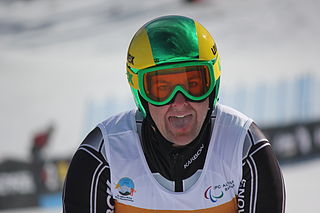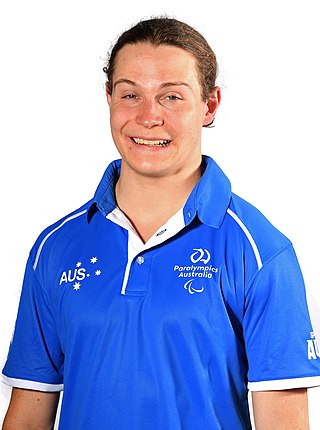
Australia participated in the 2006 Winter Paralympics in Torino, Italy, from 10 to 19 March 2006. The Turin games represented Australia's ninth appearance at the Winter Paralympic Games. Australia were represented by 10 athletes, which made it their largest ever Winter Paralympic Games contingent. Australia competed in three sports: alpine skiing, biathlon, and cross-country skiing, but not ice sledge hockey or wheelchair curling. Prior to the games, the Australian Paralympic Committee set a target of two medals, down from the seven that were won four years earlier in Salt Lake City. This was due to the retirement of three-time medallist Bart Bunting, as well as changes made to the disability classification system. This target was met with Australia winning a silver and a bronze medal to finish equal 13th on the medal tally.

Australia has participated officially in every Paralympic Games since its inauguration in 1960 except for the 1976 Winter Paralympics.

At the 2010 Winter Paralympics in Vancouver, British Columbia, Canada Australia sent ever of 11 competitors to compete against 42 other nations with a total of 502 competitors making these Paralympics the largest ever with only 39 countries competing at Torino in 2006. Of these other nations, 2010 was the first winter paralympics for Argentina, Bosnia & Herzegovina, Romania, Russian Federation, and Serbia. The delegation also consisted of 3 sighted guides and 17 support staff. This was the largest delegation Australia had sent to a Winter Paralympics. Australia has participated in every winter Paralympics. In 2010, Dominic Monypenny became the fourth Australian athlete to participate in both the Summer and Winter Paralympic Games, the others being Kyrra Grunnsund, Anthony Bonaccurso, and Michael Milton. In the lead-up to the 2010 winter Games, nine of the 11 Australian athletes had recorded top 10 finishes in Paralympic, world cup or world championship competition in their class.
The Men's Super Combined competition of the Vancouver 2010 Paralympics is held at Whistler Blackcomb in Whistler, British Columbia. The competition has been rescheduled to Sunday March 21 due to recent weather conditions.

The 1998 Winter Paralympics were held in Nagano, Japan from 5–14 March 1998. At the Games, Australia was represented by four male alpine skiers. Australia tied for 16th place with Denmark, out of 21 Nations on the overall medal tally. James Patterson, an LW9 standing skier, won Australia's two medals - one gold and one bronze.

The 1994 Winter Paralympics were held in Lillehammer, Norway. Australia sent six male skiers, who won three gold, two silver and four bronze medals. Australia, at the time, achieved their best ever performance at a Winter Paralympics, finishing 5th overall in the alpine skiing competition, 9th in the medal standings, and 11th in the total medal count out of 31 nations.

Australia competed at the 2002 Winter Paralympics in Salt Lake City, Utah, United States from 8 March to 19 March 2002. The Salt Lake Paralympics are the eighth such winter games, the first Winter Paralympics ever in North America and the first Winter Paralympics ever set up by an Olympic organizing committee. Although many of the Paralympic expenses were covered by dual planning with the Olympics, organizers still spent about $60 million on the Paralympics, including $5 million on the opening and closing ceremonies. The Salt Lake Games featured 92 events across four sports: alpine skiing, biathlon, cross-country, and ice sledge hockey. The 36 competing countries sent a total of 416 participants. Australia was represented by six male alpine skiers: Peter Boonaerts, Bart Bunting, Michael Milton, Scott Adams, Cameron Rahles-Rahbula, and Mark Drinnan. The medal haul was seven, consisting of six gold and one silver. Australia finished 8th overall in the gold and total medal count, making it the country's most successful Winter Games in terms of gold medals.

Cameron Rahles-Rahbula is a former Paralympic alpine skier from Australia. He won two bronze medals at the 2010 Winter Paralympics in Vancouver. He represented Australia in four Paralympics, stating with the 2002 Winter Paralympics in Salt Lake City and the 2006 Winter Paralympics in Torino. He did not compete in any events at the 2014 Winter Paralympics in Sochi due to knee and ankle injuries sustained during the warm up for the downhill event of the Games but carried the Australian flag in the Parade of Nations at the Opening Ceremony. He also won two gold medals and a silver medal at the 2004 IPC Alpine Skiing World Championships in Wildschönau, Austria, and a gold and a bronze medal at the 2009 World Championships in Jeongseon, Korea. He retired after the Sochi Games.
Para-alpine skiing classification is the classification system for para-alpine skiing designed to ensure fair competition between alpine skiers with different types of disabilities. The classifications are grouped into three general disability types: standing, blind and sitting. Classification governance is handled by International Paralympic Committee Alpine Skiing. Prior to that, several sport governing bodies dealt with classification including the International Sports Organization for the Disabled (ISOD), International Stoke Mandeville Games Federation (ISMWSF), International Blind Sports Federation (IBSA) and Cerebral Palsy International Sports and Recreation Association (CP-ISRA). Some classification systems are governed by bodies other than International Paralympic Committee Alpine Skiing, such as the Special Olympics. The sport is open to all competitors with a visual or physical disability. It is not open to people with intellectual disabilities.

LW1 is a para-Alpine standing skiing classification for people with severe lower extreme disabilities in both extremities. It includes both skiers with amputations and cerebral palsy. International classification is done through International Paralympic Committee Alpine Skiing, and national classification through local national sport federations. LW1 classified skiers use outriggers, and two skis or one ski with a prosthesis. Other equipment is used during training such as ski-tips, ski-bras, and short skis.

LW2 is a para-Alpine and para-Nordic standing ski sport class defined by the International Paralympic Committee (IPC). Competitors in this class have severe disability in a lower limb, which may be a result of an amputation, or arthrodesis in the leg and hip. Depending on the type of skiing, the international classification process for LW2 skiers is handled by the IPC Alpine Skiing Technical Committee and IPC Nordic Skiing Technical Committee. National sport federations handle classification on the lower levels.

Melissa Perrine is a B2 classified visually impaired para-alpine skier from Australia. She has competed at the four Winter Paralympics from 2010 to 2022. At the 2015 IPC Alpine Skiing World Championships, she won three gold, one silver and one bronze medals. At the 2018 Winter Paralympics, she won two bronze medals.

Mitchell Gourley is an Australian Paralympic alpine skier who competed for Australia in the downhill, super-G, giant slalom, slalom and super combined events at four Winter Paralympics - 2010 to 2022. He was Australian team co-captain with Joany Badenhorst at the 2018 Winter Paralympics. At the 2022 Winter Paralympics, he and Melissa Perrine carried the Australian flag in the opening ceremony. At the 2017 IPC Alpine Skiing World Championships in Tarvisio, Italy he won the gold medal in the Men's Super Combined Standing.

Andy Bor is an Australian former ski coach and sighted guide for visually impaired skiers. He was a coach at the 2006 Winter Paralympics in Torino, and was Melissa Perrine's guide skier at the 2010 Winter Paralympics in Vancouver and 2014 Winter Paralympics in Sochi.

Eric Bickerton is a former member of the Royal Australian Navy who took up skiing in 1990, and has represented the Australian military internationally. In 2008, he became Jessica Gallagher's guide skier for para-alpine skiing. Named to the 2010 Winter Paralympics team for Australia, he and Gallagher earned a bronze medal in the giant slalom event.

Australia sent nine competitors to the 2014 Winter Paralympics in Sochi, Russia. The delegation also consisted of two sighted guides and 15 support staff. The team won two bronze medals. Toby Kane won a bronze medal in the men's Super combined standing, and Jessica Gallagher and guide Christian Geiger won one in the women's giant slalom visually impaired event.
Disabled Wintersport Australia (DWA) was established in 1978 as the Australian Disabled Skiers Federation. Its current mission is "to promote and foster the advancement of participation by people with a disability in wintersport both in Australia and overseas". DWA is a member of the Australian Paralympic Committee. DWA plays a major role in the development of Australian athletes that compete at the Winter Paralympics.

Ben Tudhope is an Australian Paralympian who has competed in para-snowboard cross at three Winter Paralympics 2014 to 2022. His selection at the age of 14 at the 2014 Winter Paralympics meant that he became Australia's youngest Winter Paralympian, replacing Michael Milton. He was the youngest competitor at the 2014 Winter Paralympic Games from any country. He also competed at the 2018 Winter Paralympics. At the 2022 Winter Paralympics, he won the bronze medal in the Men's Snowboard Cross SB-LL2.

Australia sent a team of 12 athletes and three guides to the 2018 Winter Paralympics in PyeongChang, Korea. Australia finished 15th on the medal table and it was its fourth best medal performance at the Winter Paralympics.
Emily Rahles-Rahbula is a Para-alpine amputee skier from Australia. She competed at the 2006 Winter Paralympics in Torino, Italy and became Australia's first female Winter Paralympian.









